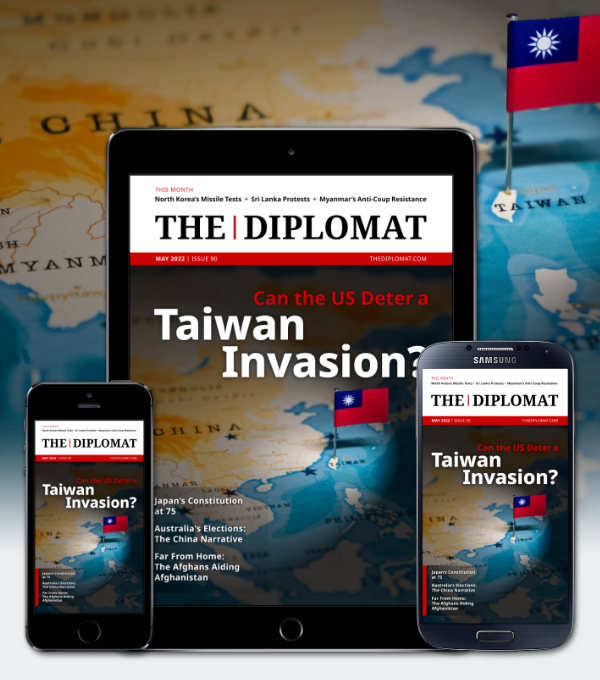| Welcome to the latest issue of Diplomat Brief. This week our top story explores the structure of Taiwan’s civil defense force – and why Ukraine is not a workable model. We also have an interview with Aidan Craney, a research fellow at La Trobe University, on the Pacific Islands’ young populations and how they could reshape their countries. |
| Story of the week |  | Security Why Taiwan Can’t Copy Ukraine’s Civil Defense BlueprintWhat Happened: Taiwan has been paying close attention to Russia’s invasion of Ukraine – both the response from the international community and Ukraine’s own strategies for self-defense against a more powerful neighbor. In the latter context, Ukraine’s successful deployment of Territorial Defense Forces has sparked discussion about the possibility of creating a similar military reserve in Taiwan. Our Focus: While the idea of organizing a robust reserve force in Taiwan might make sense in a purely military context, there are several barriers to it in practice. First, responsibility for Taiwan’s civil defense is delegated to the National Police Agency, not Taiwan’s armed forces. And, given Taiwan’s battle with organized crime in the not-so-distant past, the police are extremely leery of training Taiwanese in the use of firearms: “The police are not happy to share gun ownership,” T.H. Schee, a representative of Open Knowledge Taiwan, told The Diplomat. “For us to have territorial defense units, we must receive training in peacetime, and that requires the support of infrastructure,” added Lee Jyun-yi, an associate research fellow at the Ministry of National Defense’s Institute of National Defense and Security Research. “Currently, I don’t think we have that.” What Comes Next: Any attempt to truly remake Taiwan’s civil defense model would need dedicated political will to reform the legal structure and institute the necessary training of civilians. And, despite the incredibly high stakes for Taiwan, such an effort remains unlikely, at least in the short term. Even more limited changes, such as extending the length of Taiwan’s mandatory conscription service, have been incredibly controversial politically. “Because [President] Tsai has less than two years left of her second term, nobody wants to touch this,” Schee said. Read this story |
| Behind the News | INTERVIEW Aidan CraneyAidan Craney, a research fellow at La Trobe University and author of “Youth in Fiji and Solomon Islands: Livelihoods, Leadership and Civic Engagement,” on the role of young people (generally defined as those in their mid-30s or younger) in Pacific Island societies: “Youth in Pacific communities are expected to learn from observation and to be silent in the presence of elders unless called upon. Often, they are excluded from attending discussions of community importance at village level, alongside women.” Read the interview |
| This Week in Asia | Northeast Asia Biden Heads to South Korea, JapanU.S. President Joe Biden is making the first Asia trip of his term: From May 20-24 he will visit South Korea and Japan. It’s a crucial trip for several reasons: It will mark Biden’s first high-level engagement with new South Korean President Yoon Suk-yeol (a foreign policy neophyte) and the first in-person bilateral visit with Japan’s Prime Minister Kishida Fumio. Biden will also join an in-person Quad meeting in Tokyo. And all of this comes at an uncertain time for the region and the world, as North Korea battles a COVID-19 outbreak and Russia’s invasion of Ukraine drags on. Find out more | South Asia Pakistan’s New Government Faces Tough Economic ChoicesAfter ousting Imran Khan, the incoming government of Shehbaz Sharif had no time to celebrate. Pakistan is facing a mounting economic crisis – and the most obvious solution, resuming the IMF bail-out process begun under Khan, would require a painful hike in gas prices. Keep fuel subsidies and Pakistan may default; remove them and the Sharif government will pay the political price. Find out more | Southeast Asia Thailand’s Capital Votes in Bellwether ElectionOn Sunday, residents of Bangkok will vote in their first gubernatorial election since 2013. The election will feature a record 30 candidates, loosely divided between the allies and opponents of the government of Prime Minister Prayut Chan-o-cha. Leading the pack, and expected to win the election, is Chadchart Sittipunt, an independent candidate and former member of the opposition Pheu Thai Party. But regardless of who wins, the poll will act as a barometer of how Thais might vote in the next national election, expected to take place sometime before May 2023. Find out more | Central Asia Kazakhstan's Richest Keep Getting RicherThere's no shortage of Nazarbayevs on Forbes.kz’s latest list of Kazakhstan's richest, who seem to just get richer despite the economic crisis writ large. First President Nursultan Nazarbayev himself isn’t on the list as he officially doesn’t own or run any businesses. But that could change if Kazakhstan’s constitutional referendum goes through and strips him of his special elbasy (Leader of the Nation) privileges. Find out more | Oceania Australia’s General ElectionOn May 21, Australia will hold a general election, with Prime Minister Scott Morrison’s Coalition government hoping to extend its mandate and the opposition Labor Party keen to retake power for the first time since 2013. Foreign policy, particularly China, has played an outsized role in this year’s campaign, but ultimately it will be domestic issues – whether climate change concerns or gender issues – that drive voting. Find out more |
| Visualizing APAC |  | In the weeks after Russia invaded Ukraine, Chinese public opinion remained highly positive toward Moscow – and highly suspicious of the United States. See the full picture |
| Word of the Week | SOCIETY TürkmençilikThe Turkmen word to refer to Turkmen traditional values, culture, and identity – concepts often put into practice through controls on women’s behavior. Find out more |
|  |





